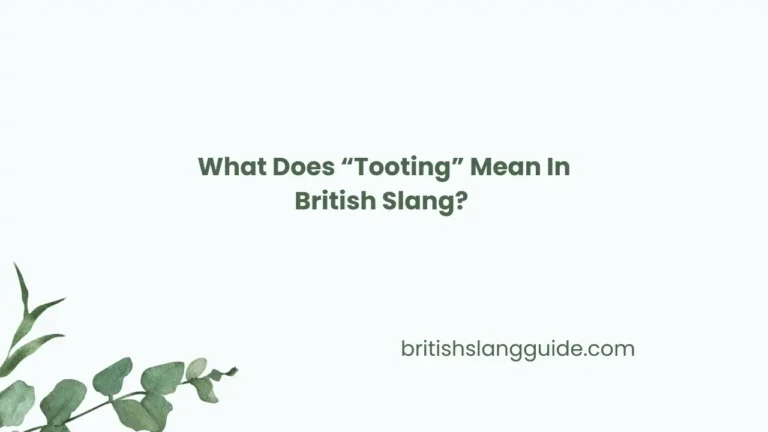10 + Best British Slang Starting With “N”
Are you eager to discover a world of lively expressions and odd phrases by speaking British terminologies? If yes, you have come to the right place, as we will provide you with the best British slang, starting with N.
British slang is used in casual and informal contexts and corresponds to a hidden language. It is composed of phrases and words that may not appear in regular dictionaries. It varies greatly according to the context and the person you are speaking with.
With our in-depth guide to British slang, we’ll take you on an informative journey across the streets of Britain. Get ready to explore the unique details of British English, which will add flavor and appeal to your conversations, from humorous phrases to fascinating slang terms.
What Does Naff Mean In British Slang?
Naff, in British slang, means to go away. However, in English, it is an expression of anger.
Other Meanings
- It also means being unstylish and needing more manners. Saying something is naff indicates that it is highly out of style or unsophisticated.
- Inferior in condition
- Naff over in British slang means to laugh it off and giggle over it (often followed by talking about it)
Origin Of Naff
The adjective “naff” means something worthless or pointless. The noun “naff” dates back to the middle of the 15th century. According to the Oxford English Dictionary, the earliest known use of naff is in a paper by lexicographer John Withals from 1553.
The origin of this word is unknown, although it might have started as an informal term that came from fanny (vagina). The word “buttocks,” which was first used in American English in 1920, comes from the previous British meaning “vulva” (1879).
Although it is no longer used in American English, the feminine sense is still the most common one outside of the country.
Synonyms For Naff
- In the sense of bad and low-grade
Awful, substandard, useless, duff, dingy, inferior, low-grade, low-quality, trashy, below grade, lousy, trashy, poxy, chickenshit, bodger, twopenny and halfpenny
- In terms of unstylish
Not suitable, unattractive, inappropriate, downright, dowdy, improper, tacky, unfashionable, nasty, broken-down, dilapidated, frumpy, and down-at-heel
- In terms of giggle over
Laugh, gag, yell, joke, joking, humorous, revolting, wisecrack, smirk, buffoon, grin, cackle, powerful pairings, squeal, hee-haw, crack up, chuckle, disgusting, snicker and guffaw.
Naff Usage As Examples
- The song is pretty naff
- Many of these have quite naff quality.
- These folks are naff
- You’ll notice that it was naff
- The bowlers are getting more pleasant naff on this wicket.
- Unfortunately, he just strikes it against the man at the backward point to naff all runs.
- The red accent is a little naff
- Isn’t it a little naff to match the painting with your couch?
What Does Narky Mean In British Slang?
In British terms, narky is characterized by a lack of patience and a bad temper. Someone who is quickly irritated and frustrated.
Origin Of Narky
The term “narky” was first recorded to have been used in the 1890s. However, it was published in 1895, when the Oxford English Dictionary first encountered the British term. Now, both British and Australian English use this word.
Synonyms For Narky
Irritable, complaining, sarcastic, dispute-prone, ill-tempered, a living nightmare, resembles a bear with a painful head, be ready for an argument, grumpiness, grumpy, grouchy, rudely, sourly, bitterly, angst, panic, fury, sour, pettishly, avarice, irritability, irritable, stroppiness, stroppy, surprisingly, sturdiness and testily
Narky Usage As Examples
You were a little narky toward me.
Their narky mindset is ideal to that of a loser.
They also enjoy the narky, tough nature of the game.
The narky behavior of those siblings gives opposition to the grief of Winnie and Millie’s bond.
He’s very narky
The reason makes clear why he was narky about my bowling skills.
Have they not exchanged a few narky remarks on the job before?
Still, it was an extremely difficult situation, and the final result meant a lot.
She then became narky with me for spending so many nights out
What Does Nasty Mean In British Slang?
In British slang, the term “nasty” means the act of behaving in an unpleasant and unkind manner.
Other Meanings
- Nasty also refers to Shockingly dirty living conditions
- As a British slang, Nasty meaning is Physically offensive
- Crude, ridiculous is another meaning of Nasty in British slang
- Refer to living a cheap life
- A nasty issue or scenario is quite alarming and challenging to handle.
- When you refer to an illness or injury as nasty, you are saying that it appears painful as well as serious. Highly dangerous or harmful
Origin Of Nasty
The British term nasty was first recorded in use in the 1820s. The first documented use of nasty in the Oxford English Dictionary originates back to 1825. It was written by novelist and women’s rights advocate John Neal. In addition, it is documented as an adjective going back to the Middle English era (1150—1500). Nasty slang is formed in English through conversion.
It is most likely a conversion from an earlier form of the Middle English word naskty, naskedy, from the Middle English nasked (“dirty, messy”), which is ultimate of Northern Germanic origin.
Synonyms For Nasty
- In terms of offensive
Cruel, ruthless, hateful, mean, unpleasant, callous, cold-blooded, unattractive, snarky, prickly, evil, awful, disgusting, repelling, bitchy, catty, malevolent and malicious
- In terms of serious and dangerous
Disgusting, deplorably, dreadful, abjectly, catastrophic, tense, terrifying, from the pit, horrifying, obnoxious, disagreeable, disagreeably, repulsive, disgustingly, unkempt, abominable, terrible, not able to support and Insensitively
- In terms of dirty
Filthy, impure, grossness, putrescence, foul matter, carrion, excreta, crud, muck, trash, sewage, pollution, smutty, dung, sewage, misery, grime, slime, excrement, nastiness, shit, crap, grot and unhygienic
Nasty Usage As Examples
- The guards looked nasty.
- She acts so nasty to me when my older brother isn’t here.
- My young granddaughter suffered a very nasty cut when her heel got trapped in the wheels of her bicycle.
- Lili had a nasty outbreak of pneumonia.
- This strong response resolved a very nasty situation.
What Does ND Mean In British Slang?
British slang “ND” is a popular term in online slang and texting. It’s an abbreviated form of the word “and.” Our online messages now include this common phrase, which helps faster and more effective communication. This British slang ND in text Snapchat, TikTok, and Instagram is also the same, and in regular texting, it is used to denote “And.”
Other Meanings
- In British slang, ND is a written acronym for a non-distended, or not enlarged and swollen, abdomen. It is utilized at times when detailing a patient’s abdomen.
- ND is used in addresses as a printed abbreviation for the United States state of North Dakota. More specifically for using with zip codes
- Ordinal numbers are named by adding—nd to written numbers that end in 2, with the exception of a number that finishes in 12.
- ND is a symbol of neodymium in elements of chemistry.
- In Stock Exchange, ND slang term stands for next day (delivery), especially for bonds.
- British slang for “no date.”
- Other additional meanings for ND also include “No dispense, No drama, and No damage.”
Origin Of ND
Nd was first mentioned by the Oxford English Dictionary in the Journal of Chemical Institute in 1885. Within English, the British term ND originates through clipping or reducing.
The word ND was originally spelled mistakenly or abbreviated. It was added to The Urban Dictionary in 2003, but individuals and typists have been using it for much longer.
Since then, ND has been used to conserve space or simply a typo because of fast typing. This kind of regular habit on social media sites invented this term. ND can also be used as an acronym for neuro-divergent since at least the late 1990s. An example of a neuro-divergent person would be someone who has schizophrenia or autism.
Synonyms For ND
- In terms of And
Also, as well as, thus, moreover, likewise, including, additionally, connected with, plus, related to, extra
- In terms of a state bordering Canada in the North-central United States
America James U.S.A., Bismarck, North Dakota, James River, Little Missouri, Fargo USA, Garden States United States, and The Roosevelt Memorial National Park
- In terms of Neodymium Chemistry
Neodymium metal, metallic element, bastnaesite, monazite, and atomic number 60
ND Usage As Examples
Examples In terms of And
- I am visiting the park ND. It is so sunny!” The above example uses “ND” to convey the phrase “And.”
- This is my early-morning exercise, ND. I am feeling fresh!” Once more, “ND” is utilized instead of “And.”
- I just got the best pastry ND coffee at this brand-new café.
Examples in terms of other Meanings
- No drama (ND), kindly. I am here only for a relaxing time. (The term “ND” here means “No Drama.”)
- The physician said ND about this prescription. ( In the field of medicine, “ND” might mean “No Dispense.”)
- As you can see, I had an ND, that’s why I got here late.
- I have to shop for a few fruits ND vegetables at my local grocery store.
- She likes to read ND communicate during her free time.
- Let’s gather at the park ND enjoy a picnic.
- The film was outstanding ND its conclusion was shocking.
What Does Nesh Mean In British Slang?
In British slang, there is no replacement for the English language term nesh. Nesh means “exceptionally susceptible to cold weather.”
Other Meanings
- Nesh also means Soft, juicy, tender, mainly dialectal
- Simple and Relaxing
- Courtesy and Kind
- Very carefully or delicate
- Hesitant or fearful
Origin Of Nesh
The verb “nesh” goes back to the Old English era, which was before 1150.
The use of this slang has been reported in Staffordshire, England, the East Midlands, Lancashire, North Wales, South Yorkshire, and Shropshire. It is generally accepted as a Nottingham word. In Newfoundland, there is a similar term, nish.
The word is related to the 16th-century Dutch word nesch, which usually means damp or stupid. It originates from the Old English word hnesce, which means frail, weak, or infirm.
In 2011, Nesh was included in the British Library’s “wordbank,” a program to save words and phrases from local languages.
Synonyms For Nesh
- In terms of hesitant
Phobia, distrust, halting, indecision, loathing, reluctance, shy, skeptical, sluggish, tentative, timid, uncertain, and unwilling.
- In terms of delicate
Extremely delicate, soft, airy, elegant, graceful, brittle, gauzy, filmy, floaty, gossamer, diaphanous, silky, wispy, fragile, dainty and subtle
- In terms of susceptible
Willing to listen, receptive to, defenceless, against a simple target, prone to, liable to, subject to, tilted to, disposed to, given to, easily affected by, in danger of, at risk of, being at the mercy of, capable of admitting, flexible of, open to, responsive to, allowing, permitting, easy, impressionable, inclined, liable, open-minded, delicate, vulnerable, and wide open.
Nesh Usage As Examples
- As one can see, when it turns a bit too cold or wet, I am enough nesh to sit by a fire.
- He said he was unable to speak up in front of the women, but he was nesh to choose his words when he was outside.
- He had never treated a stranger so nesh even though he had never met him before.
- If poor Master Eddard didn’t seem to be so nesh, I believe he would favor him.
- There was nesh grass in the spring.
What Does Nick Mean In British Slang?
In British slang, Nick means a tiny hole on an edge or surface.
Other Meanings
- When playing cricket, if you mistakenly strike the ball with the bat’s edge (which is a specifically formed piece of wood)
- British slang Nick refers to prison. When a person is arrested by the police, it means they have been caught committing a crime.
- Nick also refers to a declared state, more specifically, of health.
Origin Of Nick
The British word “nick” originated in English in the late 16th century, when it means “trick or cheat.” In 1576, the English playwright George Whetstone used the phrase “I never nicked his pay,” which means “I never stole his pay,” This is the earliest known use of the word.
The clear origin of this word has yet to be discovered. However, it has been proposed that it has something to do with the name Nicholas. During the 1940s, the name Nick was commonly linked with the devil or Satan’s minions, giving it a negative meaning.
Nick still has a second sense of slang, which is prison. The term in this meaning goes back to Australia, where it first appeared in an 1882 book of Sydney slang.
Synonyms For Nick
- In terms of stealing
Escape with someone or anything, aggravated, anti-burglary, stance, theft by hackers, spying gadget, heated-wire, breaking into a house, Job plunder, poaching, porch piracy, purloining, Jimmy Jimmy, rattle, rustle, squirrel, snitch, To grab anything; to deceive someone or overcharge them.
- In terms of cutting or a tiny hole
Abrasion, butcher, bayonet, cut, cutting, chopsticks, Hew, impalpable, impalement, impaler, sharp, Shave, cut anything out or from, something slicing, shearings of sheep, lash sliced and Slitspike.
- In terms of Prison
Authorized educational institution, The Bastille, Borstal, brig, gaoler, midway residence, HMP, open-air jail, panopticon, prison community, jail, straightjacket, the Gulag, Warder, an institution for juvenile offenders, juvenile detention, clink, cooler, dungeon, guardhouse, keep, pen, reformatory, slammer, and stockade
- In terms of the stated health condition
Illness, ailment, sickness, infection, disturbance, the ability, unfavourable circumstance, sage, atmosphere, look, personality, good or bad karma, own it in your hood, in the form of, presentation, trappings, autonomous, sombre atmosphere, vibe, and feel-check
Nick Usage As Examples
Despite one or two small nicks in the paint, the musical device is in excellent shape.
For a man his age, he is in fair nick.
The car is in a very good nick
He has spent almost all of his life in the nick.
The person was nicked for driving at 70 mph in a zone with a 50 mph speed limit.
My bike has been nick once more.
Okay, but who has Nick as my ruler?
What Does Niggled Mean In British Slang?
In British slang, Niggle means to trigger minor concerns, usually for an extended time.
Other Meanings
- to be judgmental of someone for minor details or focus too much on details
- In British slang, niggle refers to a tiny doubt or concern
- A tiny criticism
- In British terms, Niggled means to function inefficiently, particularly with a mess.
Origin Of Niggled
The slang term “niggle” goes back to the middle of the fifteenth century. The first recorded use of niggle in the Oxford English Dictionary dates back to 156 when Thomas Harman, a writer on homeless people, wrote a piece of paper.
However, niggle has an unknown origin. It is most likely derived from dialectal Norwegian nigla (“to be cheap, to busy oneself with little things”), which in turn was derived from Old Norse (stingy) and related to Old English.
Synonyms For Niggled
- In terms of criticising
Castigate, blame, denounce, condemn, apprehend, reject, criticize the censure
chide, chastise, arraign the assault, fault, knock, attack, Pillory, dislike, carp and rail against
- In terms of disapproval
Aggravate, resentful, alienate, rage, irritation, bent, idiot, go too far, hack someone off, harass, joke, or rub someone the wrong way Idioms such as “ruffler,” “set someone’s teeth on edge,” “step/tread on someone’s toes,” and “it,” Annoyance, irritation, crossness, infuriation, anger, vexation, wrath, pique, chagrin, rancour, resentment, indignation, exasperation, dissatisfaction, discontent, discontentment, and discontentedness.
- In terms of bothering
Concern oneself, trouble oneself, mind, care, worry oneself, burden oneself, occupy oneself, busy oneself, take the time, make an effort, bugging and pestering.
Niggled Usage As Examples
- For some reason, I’ve been niggling remembering his name for the past few weeks.
- She couldn’t get rid of one thought and kept niggling all the time.
- She keeps niggling over the exact pronunciation.
- I’m being niggled by the accounts department about ten dollars that they say I pay them.
- Do you not have a niggling question about the ethical nature of your experiments?
- Although I do have a few small niggles about the book, it’s great overall.
- I’ve concluded that the things that used to niggle and irritate me are unimportant.
- Why, so is there a slight niggling doubt at the back of your mind?
- Ever since I first met Neville in Nice, it has been niggling me.
- Arnold was unable to remove the riddle from his mind and kept niggling him.
What Does Nipper Mean In British Slang?
In British slang, Nipper has different meanings. As slang, It commonly refers to a little kid or youngster.
Other Meanings
- In British terms, it means anything or someone that nips
- The huge claw of a crab, lobster, or other similar crustacean is also called a Nipper
- A particular kind of small prawn that’s used as a hook
- Nipper also means a horse’s incisor tooth
- Lung irons or handcuffs
- Nipper, in British terms, also means assistance or support to a costermonger.
- Nipper also means a short rope for removing an anchor cable from a capstan and giving it to someone in need.
- Nipper is an instrument that glaziers use to cut glass.
Origin Of Nipper
From the middle of the 1500s, Nipper appears as a noun. Within English, the nipper is created by conversion.
The British term “nipper” was first recorded in use during the late 1700s. However, the first documented use of nipper in the Oxford English Dictionary goes back to David Steel’s writings in 1794.
In 1859, Nipper was used in the meaning of “little kid,” possibly from the shouting meaning “pickpocket, one who ‘pinches’ someone’s property.
Synonyms For Nipper
- In terms of youngster
a young child, youthful, adult, child, young person, adolescent man, youthful, youth aged, teenager, teen, teenage, junior, stripling, whippersnapper, arrival of an ankle-biter baby, baby in arms, comfort blanket, designer baby devil, newborn, only child, oops-a-daisy, toddler, toddler tike, toddler toilet-trained
- In terms of something that nips
shred, splash, hint, glimmer, sprinkling, touch, bit, lick, pop, go, run, rush, dash, bite, snap, nibble, pinch and catch.
Nipper Usage As Examples
- Much of the blame is on your nippers.
- Nippers are no different. They are just superb talent in every aspect.
- The other cooks had to be aware that walking around with nippers on their feet was an essential part of their job.
- How delicious are tiny nippers?
- Since they were nippers, their mother has shared a strong relationship.
- The cycling champion has already started listening to mod music for his nippers.
- Just those nippers’ fake collection must be worthwhile.
What Does Nitty Mean In British Slang?
In British slang, Nitty means foolish. It refers to a liar and a person who believes they are superior.
Other Meanings
- Nitty means a person who is not able to think even
- Not being intelligent
- An outdated term for unimportant
- The term Nitty may refer to someone so high on drugs that they are fraudulent and forgetful about their appearance.
- Someone sloppy and clumsy
- A real washer that spends the entire day pinging rubbish while posing in their Slazenger sportswear
Origin Of Nitty
The term “nitty” first appeared in use in the 1820s. Nitty first appears in the Oxford English Dictionary records in Blackwood’s Scottish Magazine in 1822. The origin of Nitty is still being determined.
Synonyms For Nitty
- In terms of foolish
Stupid, silly, absurd, mad, crazy, insane, idiotic, irrational, fantastic, ill-advised, insane, irrational, ludicrous, lunatic, idiot, goose, moron, nut, simpleton, jackass, loser and preposterous
- In terms of drug user
Dopehead, doper, drug abuser, drug fiend, druggie, freak, hophead, narcotics addict, freak, hype, cokey, hypo, and metho.
- In terms of unimportant
Frivolous, immaterial, inconsequential, insignificant, irrelevant, meaningless, negligible, null, trivial, unnecessary, useless, worthless, inconsequential, trivial, minor, of little or no value, of little or no consequence, of no account, of no moment
Nitty Usage As Examples
- It is nitty of him to interfere in his matters.
- She was sure Leo was nitty at that time when the police caught him in his compartment.
- Now that you’ve figured out these key elements, it is time to stop becoming nitty and be practical
- It is unethical to ask that my employer disclose all the nitty-gritty details of what’s in store for me.
- Jammy is so nitty that he cannot even protect Sue in times of difficulty.
What Does Numpty Mean In British Slang?
In British slang, Numpty means a foolish or dumb person. It is used to refer to someone who lacks intellectual skills.
Origin Of Numpty
The British term numpty is frequently used for somewhat rude or foolish individuals. It has origins that date back to 1794, more than two centuries before. It was first mentioned in the Oxford English Dictionary. In contrast to the more clear numbnuts or numbskull, the word “numpty” is derived from an ancient term for a foolish person called numps.
Synonyms For Numpty
Blockhead, berkbird, brain blinding, airhead, nimrod, stupid, thicko, tosser, troglodyte, turkey, dullard, dumb-ass, dummy, dunced, dunderhead, muppet, mutt need and need your head examined
Numpty Usage As Examples
- He stood there in his trousers, looking like a numpty
- Why do I continue to be attracting the numpty in my class?
- I went directly to the chase for the arrogant little numpty.
- Position it a few inches away from the pocket closest to the bottom red like that numpty did some fifteen old years ago.
- No, animals were the issue. What a collection of numpties.
What Does Nosh Mean In British Slang?
In British slang, Nosh usually means a food or meal. British people use this term to refer to a tiny portion of food eaten as a meal or in between. It is just a light snack or a meal.
Origin Of Nosh
Nosh is a British term that comes from the English word nash, which means to nibble at delicate things. It is a British word as much as an American one.
Nosh was first recorded in the 1950s. Its origins are in the Yiddish word nashn, which means “to nibble or gnaw.” Records from the mid-1800s show that the word was originally spelt, Nash.
In the UK, the word “eating” today simply means to eat. However, it used to denote a snack instead of a complete meal. Similarly, it used to be applied to a snack as a noun, but now it simply refers to food.
Synonyms For Nosh
Healthy nourishment, food, alimentation, food fare, everyday bread, food rations, iron-based rations, munchies, snacks and food, small bites, consumes, Grub bread, chow chuck, scoff f ood, Vittles, Meat, Viands, nibble, goodies, grub, pickings, rejuvenation, quick snack, a light dinner, a midnight nibble, and a little supper.
Nosh Usage As Examples
- The café offers tasty nosh
- To avoid eating too much at lunch, I have a nosh at around 10.30.
- As we waited for a seat, we asked the waitress for something to nosh on.
- We noshed on pretzels while the game played on.
- While she watched me nosh, she sprinkled spice on my food.
- They nosh on cookies and peanuts while watching TV.
What Does Nana Mean In British Slang?
In British terms, Nana slang means child’s name for a female babysitter. Nana is the mother of a baby’s mother or father. This is the slang used by British people, such as by a nanny or grandmother.
Other Meanings
- Sometimes used to denote stupid individual
- Nano also means The head
Origin Of Nana
The British slang term “Nana” has several origins in various nations worldwide. Different cultures use it as a masculine or feminine name.
The first mention of nana in the Oxford English Dictionary originates from a journal entry made by E. Pepys sometime in 1844. It’s been suggested that the term “nana” continues then in 19th-century slang and means “prostitute” or “pimp’s wife.”
Nana is likely a modification or variant of another lexical term. This name may have evolved from an early Indo-European root that reflects a kid’s speech pattern. “Nánna,” is a related word in Ancient Greek.
According to one idea, “Nana” comes out of the Italian word “Nonna,” which means grandmother. It could have been altered to “Nana” over time.
Synonyms For Nana
Ancestor, grandma, matriarch, grandma, grandmother, granny, gran, nan, nanny, nanna, nonna, grandmum and grandmom
Nana Usage As Examples
- Nana, will you tell me a story?
- Nnana refers to all third-generation kids of the same matrilineage.
- A he-goat looked after the baby kid after Nana abandoned him.
- The upper floor rooms of Nana are decorated with teak-wood meshwork.
- When Nana notices this, she takes a bit of fruit and puts it on her plate.
- She takes advice from Nana about speaking the truth.
- After that, Nana reveals that they just moved in together.
- When he got on the saddle, Nana raced like the devil even though she was half blind.
What Does Nang Mean In British Slang?
In British terms, the slang word nang means wicked, cool, and good. NANG is an informal word and is used most often in text messaging and online chat.
Origin Of Nang
The British word “nang,” which could have been of African or Afro-Caribbean background, means “good,” similar to “cool.”
The Oxford English Dictionary’s first trace of nang is from 2002. The origin of nang, however, is unknown.
Synonyms For Nang
Mischievous, playful, devilish, impish, naughty, roguish, lavish, pixie, wonderful, great, stylish, fashionable, happening, chic, exclusive, smart, elegant, fresh, placid, relaxed, sensational, nifty and hunky dory
Nang Usage As Examples
- She remained nang despite the challenging situations
- He had a nang sense of humour, was kind and humorous, and showed wisdom far greater than his years.
- After winning, she smiled so nang.
- In the play, she played the evil stepmother role nangly.
- Her nang sense of humour is well-recognized
Conclusion
Summing up, we hope you understand the above Best British slang, which starts with N. The various types of slang found in British slang show the unique history, culture, and sense of humor of the UK as a whole. Due to language and social changes over time, terms in the language, which may be phrases or slang, have changed. In the same way, British slang originating from its source also evolves. This full discussion of slang, along with definitions, historical context, and examples, will help you better understand it. Check back later for additional British slang, and let us know in the comments section if we still need to include any slang. For now, enjoy the humorous nature of these given British slang, starting with N, and use these terms to enhance your bilingual experience.







